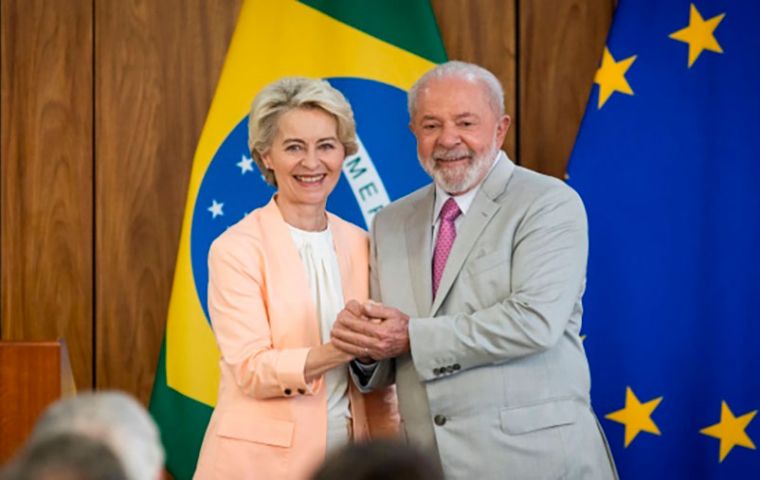MercoPress. South Atlantic News Agency
EU-Mercosur deal slowly vanishing
 Rich countries always want more, Lula said
Rich countries always want more, Lula said The European Union's Commissioner who was due to attend the Dec. 7 Mercosur Summit in Rio de Janeiro to sign the trade agreement between both blocs has canceled his trip, it was reported Sunday. According to the Financial Times, Valdis Dombrovskis shall not be attending the event, which in addition to announcements in Buenos Aires and Brasilia coupled with further negative statements from French President Emmanuel Macron, would amount to the end. at least for now, of the much-heralded agreement.
Lula and Macron met Saturday in Dubai but no progress was made. Brazil holds the pro tempore presidency of the South American alliance until Dec. 7.
Macron on Saturday spoke against the agreement due to its incompatibility with Brazil's environmental policy. The French leader said the agreement was “incoherent” and “badly patched up” because it “doesn't take into account biodiversity and the climate within it.” He added that it was “an old-fashioned trade agreement that undoes tariffs.”
Brazilian President Luiz Inácio Lula da Silva criticized France's “protectionism.” Lula also wants changes to the free trade agreement's points on government procurement bids, because, for him, it is a policy that induces the development of national industry and an opportunity for small and medium-sized companies.
While admitting the current negotiations to ratify the 2019 accord could fail, he insisted it would not be for lack of will on the part of the South American countries. “If there is no agreement, patience,” said Lula in Dubai, before leaving for Berlin where he has bilateral engagements with German authorities who do support the Mercosur-EU agreement.
“Don't say anymore that it's down to Brazil and don't say anymore that it's down to South America,” added Lula, who laid the blame on rich countries unwilling to make concessions and always wanting more.
The European Union (EU) and Mercosur reached a general political agreement in 2019 with some technical aspects unresolved. In Buenos Aires, it was announced as a diplomatic achievement by then-President Mauricio Macri. However, new demands regarding environmental issues have rendered two decades of bargaining into declaratory words with no practical effect, barring any major last-minute development.
“If there's no agreement, bear with me, it's not for lack of will. The only thing that has to be clear is that they no longer say it's because of Brazil and that they no longer say it's because of South America. Take responsibility for the fact that the rich countries don't want to make an agreement with the prospect of making any concessions, it's always about gaining more and we are no longer colonized, we are independent, we just want to be treated with the respect of independent countries that have things to sell, and the things we have have a price. What we want is a certain balance,” Lula was quoted by Agencia Brasil as saying.
Approved in 2019, after 20 years of negotiations, the Mercosur-EU agreement needs to be ratified by the parliaments of all the countries in the two blocs in order to enter into force. The negotiation involves 31 countries. It covers both tariff and regulatory issues, such as services, public procurement, trade facilitation, technical barriers, sanitary and phytosanitary measures, and intellectual property.
In Buenos Aires, Argentine Foreign Ministry Santiago Cafiero announced his country would not be signing the agreement at the Rio de Janeiro summit. “The work done is a lot, but the conditions for the affirmation are not given,” he said with barely a week left in office.
“The Mercosur-EU agreement that was initiated in 2019 has a negative impact on Mercosur's industry, without reporting in return benefits for its agricultural exports, which are limited by very restrictive quotas and subject to unilateral environmental regulations that expose them to vulnerability in the future,” Cafiero explained.
He added that the Green Pact spelled “higher costs and restrictions for Mercosur exports of food and other products.” The minister insisted that through the deal Europe would win over “a good market” whereas Mercosur's advantages remained unclear.
“Mercosur's demands are all on the table and defend the interests of agriculture and industry. As we have already said on different occasions, an agreement may be beneficial but not just any agreement is beneficial,” Cafiero stressed.
Argentina's future Foreign Minister Diana Mondino regretted Cafiero's announcement. “It is not only with the EU but also with EFTA, Singapore, and ASEAN, these are monumental doors that are opening. Hopefully, it will be signed now, Alberto will make it concrete and take this achievement with him. It is much better to have the agreement than not to have it,” she said.




Top Comments
Disclaimer & comment rulesCommenting for this story is now closed.
If you have a Facebook account, become a fan and comment on our Facebook Page!